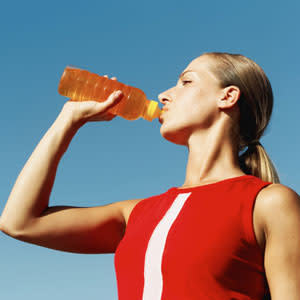Are sports drinks better than water?
By Sarah B. Weir
More from Green Picks blog

Are sports drinks better than water? The beverage industry would like you to think so. According to Beverage Digest, PepsiCo (the maker of Gatorade), the Coca-Cola Company (the maker of Powerade), and others made about 7 billion dollars in 2010 promoting the idea that to prevent dehydration and optimize performance, you need to guzzle their products.
However, unless you are a high-intensity athlete, water is still the best option, without the cost or calories.
Although sports drinks are marketed to the general population, they do not offer added health benefits to sedentary adults or even moderate exercisers but do provide unnecessary amounts of sugar, sodium, and artificial flavorings and preservatives.
A 20-ounce bottle of Powerade is about 150 calories and contains 38 grams of sugar. Responding to America's obesity epidemic, the Center for Disease Control recommends against using drinks with added sugar for purposes of hydration.
With children, use sports drinks with caution
A clinical report published on May 30, 2011, by the American Academy of Pediatrics advises against children drinking sports drinks unless they are participating in prolonged athletic competitions and suggests that even then, the consumption of sports drinks should be carefully managed.
According to the report, the popularity of sports drinks is chipping away at healthier patterns of beverage consumption (such as drinking water or low fat milk) and contributing to childhood overweight and obesity. The citric acid contained in these beverages also causes dental erosion.
Another issue the researchers point out is that most children and teens do not recognize the difference between sports drinks and energy drinks and use them interchangeably. Energy drinks are unregulated by the FDA and contain high amounts of caffeine as well as amino acids and herbs with uncertain health risks and should never be consumed by kids.
For endurance athletes, sports drinks may help
Most sports drinks contain a combination of water, carbohydrates in the form of sucrose or high-fructose corn syrup and electrolytes such as sodium, potassium, and magnesium.
According to the American College of Sports Medicine, athletes who are performing high-intensity, endurance sports for more than 60-90 minutes, especially in hot weather, may experience an improvement in performance after drinking a sports drink.
Carbohydrates can help prevent fatigue by boosting blood sugar levels and replacing glycogen stores in muscles.
Electrolytes carry electrical impulses through the tissues of the body and are important for maintaining proper fluid levels and muscle function. The average person consumes all the electrolytes they need through their daily diet, however some can be lost during excessive sweating.
Try healthy sports drink alternatives
While water is the best choice when you are thirsty or after light-moderate exercise, when you want something with a little extra flavor, there are some natural alternatives that are healthy and taste delicious.
Herbal iced tea: Steeped herbal iced tea makes a pleasing alternative to plain water. Just avoid caffeine and herbs that are diuretic. Mint and verbena are safe, tasty choices that don't require a lot of sweetener.
Low fat milk: 1% or skimmed milk contains the right balance of protein and carbs to help muscles rebuild after vigorous exercise.
Coconut water: The juice from inside young coconuts is high in potassium, antioxidants, and other minerals and is a refreshing non-fat drink. It contains about half the calories of the average commercial sports drink.
Fruit: The American College of Sports Medicine recommends eating fruit to refuel muscles after exercising. A quarter cup of dried fruit or 2-3 pieces of fruit such as apples or oranges will help replace glycogen stores.
Watermelon, honeydew melon, and stone fruits such as peaches and plums contain lots of water for hydration as well as healthy, natural fruit sugars for energy.
Bananas are high in potassium, a key electrolyte, and a good source of carbohydrates.
Check out Yahoo! Green on Twitter and Facebook.

